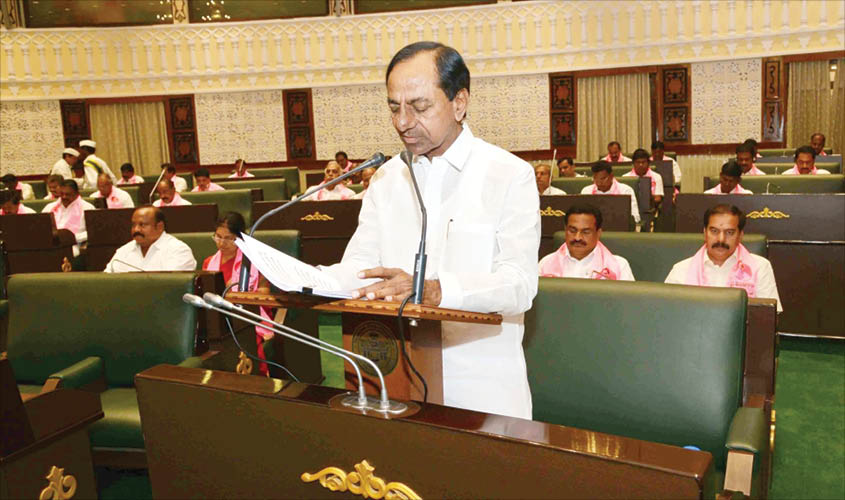HYDERABAD: Perhaps reflecting the impact of recession on public finances, Telangana became the first state in the country to cut its annual budget by around 20% and clamp down on all developmental expenditure besides planning to sell off the government-owned land to raise funds to meet its both ends. Chief Minister K. Chandrasekhar Rao (KCR), who presented the budget in the Assembly officially, “regretted doing so”.
KCR’s full-fledged budget for 2019-20 on 9 September stunned both the ruling and the Opposition benches as he had reduced the size of his vote-on-account presented in February from Rs 1.86 lakh crore to Rs 1.46 lakh crore. He blamed it on three factors for this sharp decline in the budget—fall in central funds and state revenues and burgeoning spending on populist schemes.
KCR attributed the shrinkage of his budget to the fall in the country’s GDP growth to 5% in the last quarter ending June 2019. “We expected a rise by 22.68% growth in state revenues, but our actual are only 1.36%, while the Centre drastically cut its allocations to us; we have no other go but to cut our budget,” KCR told the Assembly.
This drastic cut in the vote-on-accounts proposals by a regular budget for the remaining five months of the financial year is in contrast with the claims of KCR since Telangana was formed over five years ago. He always boasted of the state being a “surplus” one, thanks to the tax collections from Hyderabad city that accounts for around one-third of the entire state’s economy.
When Telangana was formed in 2014, the KCR government presented a Rs 1.03 lakh crore budget, though doubts were expressed over the projected figures which were in variance with those of erstwhile combined state’s share from the region. In 2015-16, the size grew to Rs 1.15 lakh crore, followed by Rs 1.32 lakh crore, Rs 1.46 lakh crore and Rs 1.72 lakh crore in 2016-17, 2017-18 and 2018-19 respectively.
These figures were questioned by not only the Opposition parties, but also by experts who stated that the actual spending in any year was much below that the budgeted funds. As this happens—where actual spending is much below that of the budgeted figures—there were no objections from the Centre as well as the Niti Aayog.
As per original claims of KCR, this year’s budget should have crossed Rs 2 lakh- crore figure. His vote-on-account figure of Rs 1.86 lakh crore, too, was considered a step in the direction of the actual budget touching Rs 2 lakh crore. However, the Chief Minister came to the view that there was no point in projecting higher figures when the actual situation is far from it, sources in the finance department told this newspaper.
Calling for a “realistic budget” this year, KCR, who held the finance portfolio till a day before the budget presentation, ordered cuts in all allocations, mostly capital expenditure (means new schemes and projects), while retaining allocations for revenue expenditure (means salaries, pensions, subsidies and other maintenance spending).
This “realistic budget” is sure to hit most of the pet schemes of KCR—Rythu Bandhu, which gives all farmers an annual free assistance of Rs 10,000 per acre and 24/7 power supply to agriculture sector and enhanced pensions, unemployment allowance etc. As most of government’s irrigation projects are funded by bank loans, debt burden has crossed Rs 3 lakh crore and debt servicing Rs 14,000 crore per year.
To tide over this crisis-like situation, KCR told the Assembly that he would mobilise funds through the sale of government lands in and around Hyderabad city, to net around Rs 10,000 crore. These lands are located around the capital city. Auction of government lands to generate funds is not a new thing for Telangana or for that matter to previous combined Andhra Pradesh.
Due to demand for real estate around Hyderabad, mainly from the IT industry and multinational companies, the governments had resorted to sale of costly lands that were freed from legal cases. Though this is a clean source of income to beleaguered governments, Opposition parties have lashed out at them for squandering the precious public assets, meant for needs of coming generations.
Newly inducted Finance Minister T. Harish Rao later told The Sunday Guardian that the government would press the emergency button to stop all waste expenditure. “This year, we will do away with customary dinner for MLAs and MLCs at the end of budget session on 22 September. We will also do away from the practice of offering gifts to our legislators at the end of the session,” Rao said.
However, these temporary measures are unlikely to solve the problems of the TRS government which came to power for a second term with huge expectations from people. Government employees, who have been demanding higher wages, interim relief and increase in their retirement age from 58 to 61 years, may oppose any deferment of their demands in view of the precarious financial condition of the state.
Similarly, unemployed youth who have been waiting for a promised monthly allowance of around Rs 2,000 too might resort to the agitation path in case the government backs out of the move. The TRS, in its election manifesto, had promised unemployment allowance, but the present funds crunch will make it tough to implement the promise.

